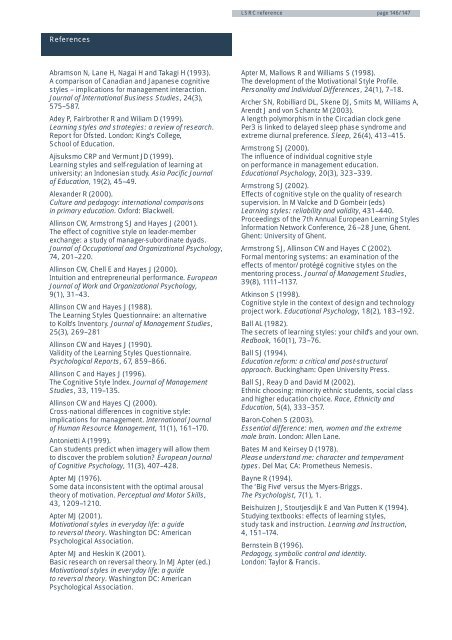learning-styles
learning-styles
learning-styles
Create successful ePaper yourself
Turn your PDF publications into a flip-book with our unique Google optimized e-Paper software.
LSRC reference<br />
page 146/147<br />
References<br />
Abramson N, Lane H, Nagai H and Takagi H (1993).<br />
A comparison of Canadian and Japanese cognitive<br />
<strong>styles</strong> – implications for management interaction.<br />
Journal of International Business Studies, 24(3),<br />
575–587.<br />
Adey P, Fairbrother R and Wiliam D (1999).<br />
Learning <strong>styles</strong> and strategies: a review of research.<br />
Report for Ofsted. London: King’s College,<br />
School of Education.<br />
Ajisuksmo CRP and Vermunt JD (1999).<br />
Learning <strong>styles</strong> and self-regulation of <strong>learning</strong> at<br />
university: an Indonesian study. Asia Pacific Journal<br />
of Education, 19(2), 45–49.<br />
Alexander R (2000).<br />
Culture and pedagogy: international comparisons<br />
in primary education. Oxford: Blackwell.<br />
Allinson CW, Armstrong SJ and Hayes J (2001).<br />
The effect of cognitive style on leader-member<br />
exchange: a study of manager-subordinate dyads.<br />
Journal of Occupational and Organizational Psychology,<br />
74, 201–220.<br />
Allinson CW, Chell E and Hayes J (2000).<br />
Intuition and entrepreneurial performance. European<br />
Journal of Work and Organizational Psychology,<br />
9(1), 31–43.<br />
Allinson CW and Hayes J (1988).<br />
The Learning Styles Questionnaire: an alternative<br />
to Kolb’s Inventory. Journal of Management Studies,<br />
25(3), 269–281<br />
Allinson CW and Hayes J (1990).<br />
Validity of the Learning Styles Questionnaire.<br />
Psychological Reports, 67, 859–866.<br />
Allinson C and Hayes J (1996).<br />
The Cognitive Style Index. Journal of Management<br />
Studies, 33, 119–135.<br />
Allinson CW and Hayes CJ (2000).<br />
Cross-national differences in cognitive style:<br />
implications for management. International Journal<br />
of Human Resource Management, 11(1), 161–170.<br />
Antonietti A (1999).<br />
Can students predict when imagery will allow them<br />
to discover the problem solution? European Journal<br />
of Cognitive Psychology, 11(3), 407–428.<br />
Apter MJ (1976).<br />
Some data inconsistent with the optimal arousal<br />
theory of motivation. Perceptual and Motor Skills,<br />
43, 1209–1210.<br />
Apter MJ (2001).<br />
Motivational <strong>styles</strong> in everyday life: a guide<br />
to reversal theory. Washington DC: American<br />
Psychological Association.<br />
Apter MJ and Heskin K (2001).<br />
Basic research on reversal theory. In MJ Apter (ed.)<br />
Motivational <strong>styles</strong> in everyday life: a guide<br />
to reversal theory. Washington DC: American<br />
Psychological Association.<br />
Apter M, Mallows R and Williams S (1998).<br />
The development of the Motivational Style Profile.<br />
Personality and Individual Differences, 24(1), 7–18.<br />
Archer SN, Robilliard DL, Skene DJ, Smits M, Williams A,<br />
Arendt J and von Schantz M (2003).<br />
A length polymorphism in the Circadian clock gene<br />
Per3 is linked to delayed sleep phase syndrome and<br />
extreme diurnal preference. Sleep, 26(4), 413–415.<br />
Armstrong SJ (2000).<br />
The influence of individual cognitive style<br />
on performance in management education.<br />
Educational Psychology, 20(3), 323–339.<br />
Armstrong SJ (2002).<br />
Effects of cognitive style on the quality of research<br />
supervision. In M Valcke and D Gombeir (eds)<br />
Learning <strong>styles</strong>: reliability and validity, 431–440.<br />
Proceedings of the 7th Annual European Learning Styles<br />
Information Network Conference, 26–28 June, Ghent.<br />
Ghent: University of Ghent.<br />
Armstrong SJ, Allinson CW and Hayes C (2002).<br />
Formal mentoring systems: an examination of the<br />
effects of mentor/protégé cognitive <strong>styles</strong> on the<br />
mentoring process. Journal of Management Studies,<br />
39(8), 1111–1137.<br />
Atkinson S (1998).<br />
Cognitive style in the context of design and technology<br />
project work. Educational Psychology, 18(2), 183–192.<br />
Ball AL (1982).<br />
The secrets of <strong>learning</strong> <strong>styles</strong>: your child’s and your own.<br />
Redbook, 160(1), 73–76.<br />
Ball SJ (1994).<br />
Education reform: a critical and post-structural<br />
approach. Buckingham: Open University Press.<br />
Ball SJ, Reay D and David M (2002).<br />
Ethnic choosing: minority ethnic students, social class<br />
and higher education choice. Race, Ethnicity and<br />
Education, 5(4), 333–357.<br />
Baron-Cohen S (2003).<br />
Essential difference: men, women and the extreme<br />
male brain. London: Allen Lane.<br />
Bates M and Keirsey D (1978).<br />
Please understand me: character and temperament<br />
types. Del Mar, CA: Prometheus Nemesis.<br />
Bayne R (1994).<br />
The ‘Big Five’ versus the Myers-Briggs.<br />
The Psychologist, 7(1), 1.<br />
Beishuizen J, Stoutjesdijk E and Van Putten K (1994).<br />
Studying textbooks: effects of <strong>learning</strong> <strong>styles</strong>,<br />
study task and instruction. Learning and Instruction,<br />
4, 151–174.<br />
Bernstein B (1996).<br />
Pedagogy, symbolic control and identity.<br />
London: Taylor & Francis.


